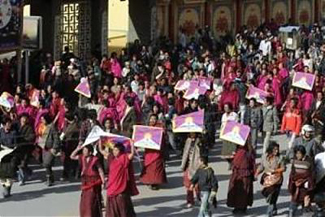Submitted by Diane Farsetta on
 "China has begun to fight back against criticism of its handling of the Tibetan protests," during which protesters have been killed, with a "sustained publicity offensive as well as blocking foreign broadcasters and websites and denying journalists access to areas of unrest," reports The Guardian. "After days of ignoring and then playing down protests," Chinese television stations "aired hours of Friday's anti-Chinese riots in Lhasa." China's English-language TV service was told "to keep broadcasting footage of burned-out shops and Chinese wounded in attacks. No peaceful demonstrators were shown." An international reporter remarked that while the images of injured Chinese are "genuine," they're "not put in context." The Chinese government has also blacked out international TV broadcasts, blocked online videos and censored Internet searches about the protests, reports BBC News. In response, the U.S. government is increasing its international radio broadcasts into Tibet. "Our audience clearly will benefit from these trustworthy sources of news and information, which differ sharply from Chinese government sanctioned broadcasts," said U.S. Broadcasting Board of Governors chair James Glassman.
"China has begun to fight back against criticism of its handling of the Tibetan protests," during which protesters have been killed, with a "sustained publicity offensive as well as blocking foreign broadcasters and websites and denying journalists access to areas of unrest," reports The Guardian. "After days of ignoring and then playing down protests," Chinese television stations "aired hours of Friday's anti-Chinese riots in Lhasa." China's English-language TV service was told "to keep broadcasting footage of burned-out shops and Chinese wounded in attacks. No peaceful demonstrators were shown." An international reporter remarked that while the images of injured Chinese are "genuine," they're "not put in context." The Chinese government has also blacked out international TV broadcasts, blocked online videos and censored Internet searches about the protests, reports BBC News. In response, the U.S. government is increasing its international radio broadcasts into Tibet. "Our audience clearly will benefit from these trustworthy sources of news and information, which differ sharply from Chinese government sanctioned broadcasts," said U.S. Broadcasting Board of Governors chair James Glassman.

Comments
Diane Farsetta replied on Permalink
Internet code of conduct being developed
From [http://www.infoworld.com/article/08/03/18/Chinese-Internet-censorship-code-of-conduct-in-the-works_1.html?source=NLC-GOV&cgd=2008-03-18 IDG News Service]:
Diane Farsetta replied on Permalink
And more pressure on Olympics sponsors
"Until last week, the [Beijing Olympics] sponsors' biggest concern was pressure over Darfur," reports the [http://www.washingtonpost.com/wp-dyn/content/article/2008/03/19/AR2008031902617.html Washington Post]:
Sophie Alexandra replied on Permalink
Yahoo and MSN are supporting
Yahoo and MSN are supporting the Chinese authorities by posting 'wanted' posters for the rioters on their sites. Two of the 24 on the list have already been caught.
http://observers.france24.com/en/content/20080321-yahoo-msn-used-root-out-tibetan-rioters-china
Szilveszter replied on Permalink
DALAI LAMA IN LIVE
Live brodcasts performances of Dalai Lama from Budapest at Saturday and Sunday. TOTALLY FREE! --> http://mahjongvillage.com/